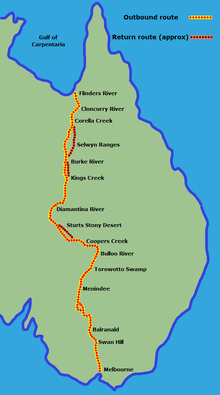The Burke and Wills expedition 1860 was led by Robert O'Hara Burke (1821-1861).
Together with William John Wills (1834 - 1861) they became the first men to cross Australia from south to north.
The Burke and Wills expedition
In 1860 the Government of South Australia offered a prize to the first expedition to cross the Australian continent from south to north. Policeman, Robert O'Hara Burke led an expedition which left from Royal Park, Melbourne on 20 August 1860.
Burke travelled with 18 people, 25 camels, 22 horses and some wagons. This was the first expedition to use camels as a means of transport. Burke took a two year supply of food, as well as 80 pairs of shoes, beds, hats and buckets, as well as some firewood.
Burke and Wills: their expedition left Melbourne in 1860
The expedition reached Menindee in about 8 weeks. It is believed that while here, Burke heard that John McDouall Stuart was going to attempt to cross the continent from south to north also.
Burke left some of the men at Menindee and went on with others to Cooper Creek where he established a base camp.
Burke's plan was to wait at Cooper Creek until the others arrived. But five weeks passed and they did not arrive.
First they were delayed back at Menindee and then on the journey to Cooper Creek some men got sick and died. The remaining men decided to stop before reaching Cooper Creek at a place called Bulloo.
Cooper Creek© iStock
After waiting for the five weeks, Burke became impatient to race to the Gulf of Carpentaria to become the first white men to cross Australia from south to north.
Burke decided to set out with William John Wills, John King and Charles Gray with one horse, six camels and supplies to last for three months. He ordered four other men to remain at Cooper Creek, with William Brahe in charge, and wait three months for their return.
Burke and his party took eight weeks to get from Cooper Creek to the Gulf of Carpentaria. Although they reached the Gulf , they failed to see the sea because mud and thick mangrove swamps blocked their path. Burke began the return to journey to Cooper Creek immediately. On this journey supplies were short so the men killed and ate one of the camels and later Burke's horse. Charles Gray got sick and died.
When they got back to Cooper Creek, Burke, Wills and King found that the men who had been waiting for almost 5 months had left. Some food had been left buried in a box and near a tree with a sign carved on it saying 'DIG'. A letter inside the box indicated that William Brahe the other men had left just nine hours before the return of Burke, Wills and King, thinking that the party must have died.
You can see a photograph of the 'Dig Tree' at Cooper Creek here
In his diary Wills wrote:
Our disappointment at finding the depot deserted may easily be imagined; returning in an exhausted state after four months of the severest travelling and privation, with our legs so paralysed so that each found it a most trying task to walk just a few yards.
Go here to read more about the expedition from the National Library of Australia
https://trove.nla.gov.au/search?keyword=Burke%20and%20wills
Read Wills’ diary here
Burke, Wills and King were too weak to follow Brahe on foot. Wills buried his notebooks and left a note telling where the group were heading, but no one thought to make a sign at the Dig Tree to indicate that they had been there and were still alive.
This was a costly mistake because two of the men who had left earlier came back a few days later to see if Burke and his group had returned. Because Wills and the others had made no sign, these men left again.
Meanwhile, Burke, Wills and King had set off down the creek, hoping to catch some fish while making their way to Mount Hopeless. Although local Aboriginal people helped the explorers and gave them food, Burke didn't trust them and often chased them away and fired his rifle at them.
King survived the expedition, being helped by Aboriginal people
By now the Burke, Wills and King were very sick and were starving. Burke died of starvation on July 1, 1861. Wills died a few days later. After burying Wills, King joined the Yantruwanta people, who looked after him until he was found a few months later, on September 15, 1861 by other explorers.
The leader of the party that rescued King, a man called Howitt, was instructed to bring back the bones of Burke and Wills so that a public funeral could be held. It was one of the biggest funerals ever seen in Melbourne at that time. Large sums of money were given to the families of Burke and Wills, and a pension was given to King, who did not live very long owing to the ill health caused by the hardships he had endured. The Aboriginal people who cared for him were also paid a reward.
It’s a good idea to find information from more than one source!
Read and watch videos:
http://cbhsyearfivehistory.weebly.com/burke-and-wills.html







